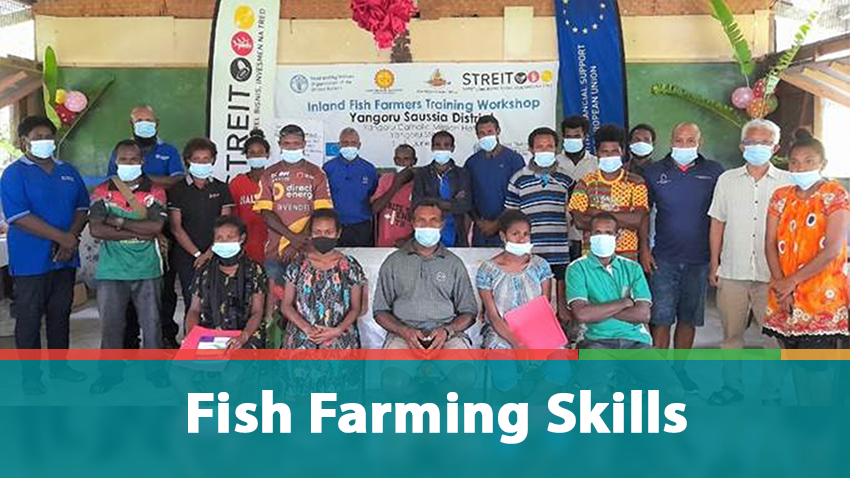
Local fish farmers in Yangoru-Saussia District in the East Sepik Province can now be able to effectively manage and sustain tilapia fish farms.
The knowledge and skills received on tilapia fish farming, includes how to properly manage and clean fisheries facilities.
The Inland Fisheries farming training workshop was provided by the EU-STREIT PNG, as part of its Fisheries component in the province earlier this month.
Fifteen farmers, four of them women, from Numbo, Sasowia, East and West Yangoru LLGs attended the training held at the Catholic Mission Hall.
The training focused on the advantages of tilapia fish farming, the biology and life cycle of tilapia, fingerlings stocking, how to produce fish feed from readily available ingredients, fish farm management, bookkeeping and handling/harvesting of mature fish with integrated fish and poultry farming.
Leading the training, EU-STREIT Fish Specialist, Francisco Noble explained the benefits of tilapia fish farming and why it is being encouraged by the Programme.
“The tilapia has a stable supply and demand; it is a top consumer choice with a steady growth pattern and can provide a good return for the farmers in terms of revenue,” he said.
The training also included practical sessions where participants visited fishponds in the district and were shown how to clean and maintain these ponds properly as the weekly and monthly cleaning of the ponds is necessary to ensure the health of the fish and plants, and the quality of water coming into the pond.
One female participant said, “I really appreciate what I learned and will transfer this knowledge to my siblings and others in the community on how to manage our ponds properly because fish is an important source of protein for wellbeing.”
“We want more of such trainings to come to the villages but also want fish farming tools to motivate us to rehabilitate our fishing ponds,” she added.
According to the District Agriculture Officer, William Neimani, an earlier survey established that there are 113 inland fish farmers in the district.
“We’re grateful for EU and FAO to choose Yangoru-Saussia as the first district for such opportunities to offer life skills and knowledge to our rural people. We want this partnership to continue for our other farmers to take part as well,” he said.
The EU-STREIT PNG focuses on increasing sustainable and inclusive economic development of rural areas through Increasing the economic returns and opportunities from cocoa, vanilla and fishery value chains.
The focus of the programme under the fisheries value chain is on inshore & riverine fishing and aquaculture. This intervention aims to serve a dual diversification enterprise development as well as ensuring food security and nutrition. In order to achieve these goals, the Programme works on increasing fishing efficiency and returns, establishing fisheries cold chains, setting up hatcheries, and improving feeding management.
